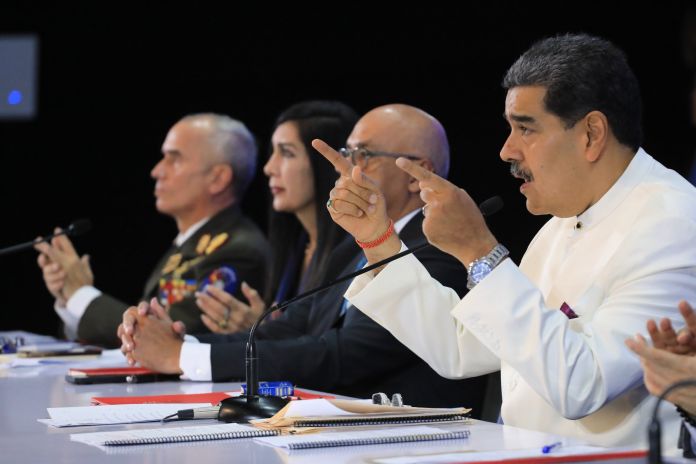— President Maduro ordered the creation of several civil and military institutions for the disputed Essequibo region.
CARACAS, (venezuelanalysis.com) – The Venezuelan government has firmly condemned Guyanese President Irfaan Ali’s overtures to the US Southern Command (Southcom) and other military partners in the disputed Essequibo Strip.
In a statement issued on Wednesday, the Venezuelan foreign ministry rejected Guyana’s “imprudent attitude” for opening “the possibility for an imperial power to install military bases,” threatening the region’s stability.
“The Cooperative Republic of Guyana is recklessly attacking international law by carrying out actions that aggravate the territorial controversy. This adds to its illegal conduct of granting oil exploitation licenses to ExxonMobil over a sea pending delimitation with Venezuela,” read the communique.
Caracas urged Georgetown to return to the path of direct dialogue through the 1966 Geneva Agreement, which Venezuela defends as the only binding instrument to find a negotiated solution to the Essequibo territorial dispute.
Venezuela maintains that the Essequibo has been part of its territory since the country’s independence from Spain in the early 1800s. For its part, Guyana – a former Dutch and British colony until 1966 – says the border issue was settled by an arbitration panel in 1899 and has requested the International Court of Justice (ICJ) to uphold the ruling. The court is currently weighing the matter, while Caracas has challenged the ICJ’s jurisdiction.
The longstanding dispute flared up in 2015 following the discovery of massive offshore oil deposits. Since then Guyanese governments have proceeded with bidding processes for oil exploration in the Essequibo’s territorial waters, which Caracas argues violate the unresolved legal battle.
The Maduro government has repeatedly accused Guyana of serving the interests of oil giant ExxonMobil, the main oil producer in the Essequibo. A June 2023 Intercept investigation documented the close ties between Georgetown and Exxon.
On Tuesday, president Irfaan Ali announced that the Guyana Defence Force (GDF) was “on full alert” and had “engaged its military counterparts including the US Southern Command” to safeguard the Essequibo territory. On Thursday, according to the US embassy in Guyana, the US Southcom conducted “flight operations” alongside the GDF.
US state department spokesperson Matt Miller also said Thursday that secretary Antony Blinken spoke with president Ali to reaffirm Washington’s support “for Guyana’s sovereignty and our robust security and economic cooperation.” Miller informed that Guyana will join the UN Security Council in January 2024.
Guyana has also sought support from Brazil, the United Kingdom, France, the Organization of American States (OAS), the Caribbean Community (CARICOM) and the Commonwealth while pledging to escalate the matter to the UN Security Council.
“Our first line of defense is diplomacy, but we are also preparing for the worst-case scenario. We are preparing with our allies, with our friends, to ensure that we are in a position to defend what is ours,” the Guyanese leader reiterated in an interview with CBS News.
On Wednesday, tensions seemed to recede momentarily with Venezuelan foreign minister Yván Gil holding a phone conversation with his Guyanese counterpart Hugh Todd in which they agreed to keep communication channels open. Another good sign was Guyanese officials reaching out to Cuba amidst the heightened controversy, but Havana has not commented on the issue.
Brazil has followed the controversy closely and reinforced its military presence along the border with Venezuela and Guyana. On Thursday, Brazilian president Lula da Silva expressed “growing concern” about the escalating dispute and proposed that CELAC mediate between the two parties.
For its part, China’s foreign ministry spokesperson Wang Wenbin said on Wednesday that Beijing supported both nations “in properly resolving questions about border delineations.”
Guyana’s increased military activity occurred after president Nicolás Maduro announced several measures regarding the Essequibo territory following Sunday’s referendum in which Venezuelans voted 95-98 percent “yes” to support the country’s sovereignty claim over the disputed region. The measures were perceived by Georgetown as a “direct threat.”
On Tuesday, Maduro proposed a bill to create a Venezuelan state called Guayana Esequiba in the resource-rich region which the National Assembly (AN) immediately began discussing. The new state would be provisionally administered from Tumeremo, a town in Bolívar state bordering the Essequibo area.
Venezuelan authorities’ first task will be conducting a census to issue identity cards for the roughly 125,000 people living in Essequibo and provide emergency social programs.
President Maduro went one step further by Venezuela’s state companies “to grant operating licenses for the exploration of oil, gas and mining in the entire area of our Essequibo.”
The Venezuelan leader likewise proposed a special law to ban dealings with companies that operate with Guyanese concessions and demanded they leave the Essequibo waters within three months once the legislation is approved.
Additionally, the Venezuelan president announced the creation of a Defense Operational Zone for the entire Essequibo region, a special law for environmental protection and the publication of new maps of Venezuela showing Essequibo as part of its territory.
It is unknown how Caracas plans to carry out these measures within the Essequibo as the 160,000 square kilometer area has been administered and controlled by Guyana for more than a century.
Last week the ICJ issued a ruling that Venezuela should “refrain from taking any action” that would modify the present circumstances whereby the Essequibo Strip is under Guyanese administration.
On Wednesday, UN secretary-general António Guterres took note of the ICJ mandate and supported “the use of exclusively peaceful means to resolve international disputes.” Caracas said the statement was biased and pretended to force Venezuela into recognizing the ICJ jurisdiction.





